Essay: Development of Contemporary Tourism - Tourism Module
VerifiedAdded on 2023/06/08
|9
|2049
|174
Essay
AI Summary
This essay provides a comprehensive overview of contemporary tourism, examining its evolution and multifaceted impacts. It delves into the economic, social, cultural, and environmental dimensions of the tourism industry, highlighting both positive and negative ramifications. The essay discusses the influence of technology, the impact of global events like the pandemic, and various internal and external factors affecting tourism. It explores the significance of destination and source regions, marketing functions, and the intricate relationship between tourism and the environment. Furthermore, the essay analyzes the socioeconomic impacts of tourism, including employment, revenue, and changes in lifestyle, culture and the importance of risk management plans and security, while also addressing the challenges of over-dependency, pollution, and resource utilization. It concludes by emphasizing the importance of sustainable practices, responsible tourism, and the industry's crucial role in national development. The essay uses several research materials, including books and journals, to support its arguments and provide a well-rounded understanding of the subject matter.
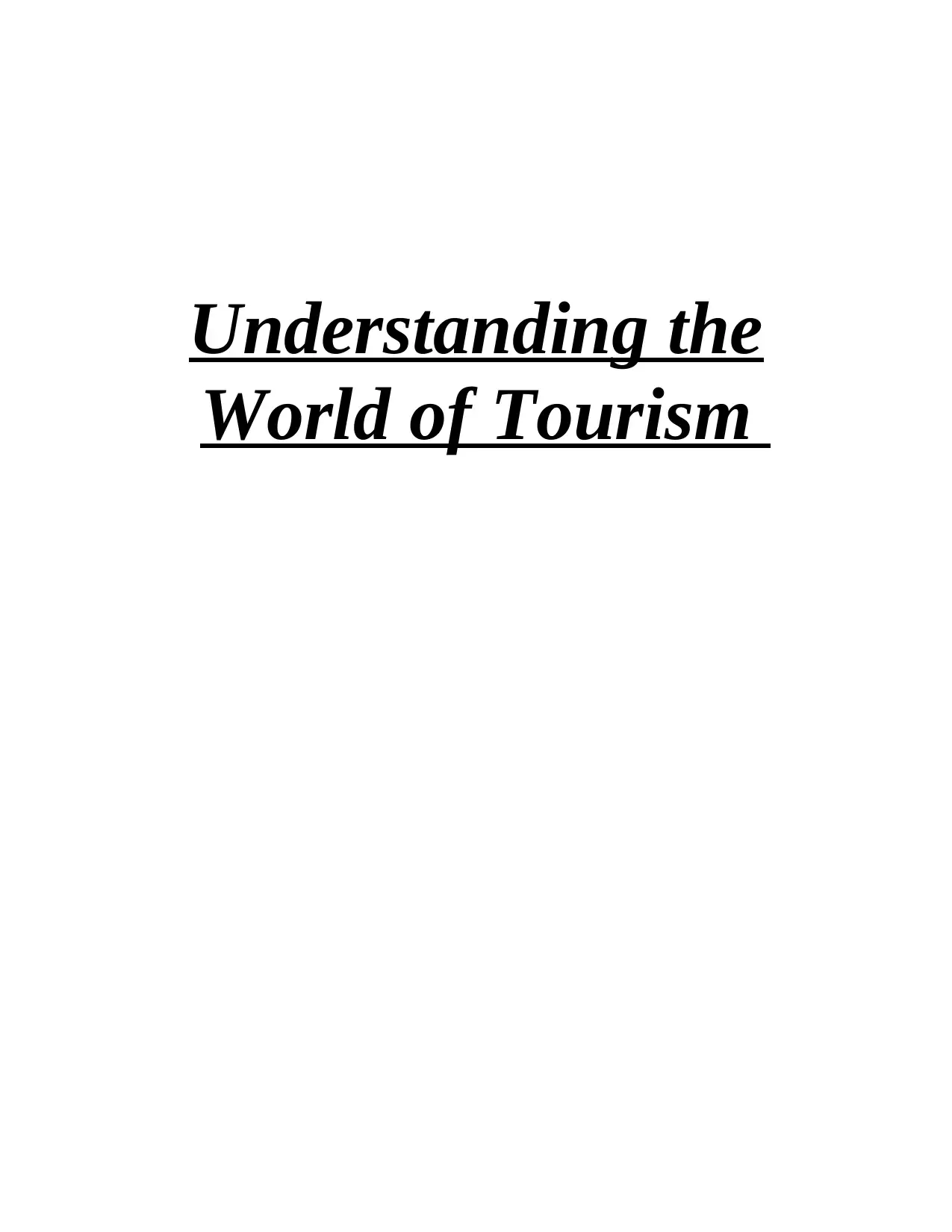
Understanding the
World of Tourism
World of Tourism
Paraphrase This Document
Need a fresh take? Get an instant paraphrase of this document with our AI Paraphraser
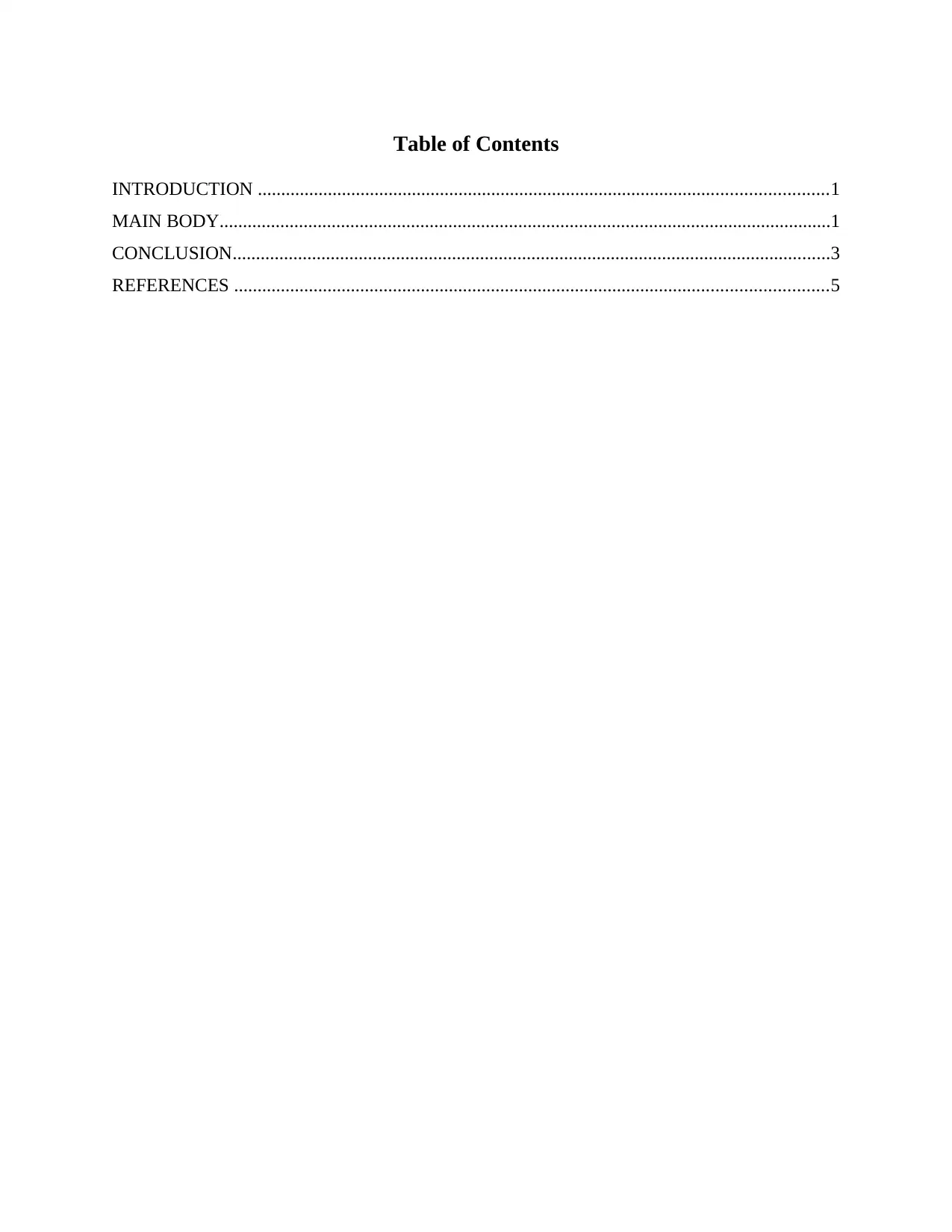
Table of Contents
INTRODUCTION ..........................................................................................................................1
MAIN BODY...................................................................................................................................1
CONCLUSION................................................................................................................................3
REFERENCES ...............................................................................................................................5
INTRODUCTION ..........................................................................................................................1
MAIN BODY...................................................................................................................................1
CONCLUSION................................................................................................................................3
REFERENCES ...............................................................................................................................5
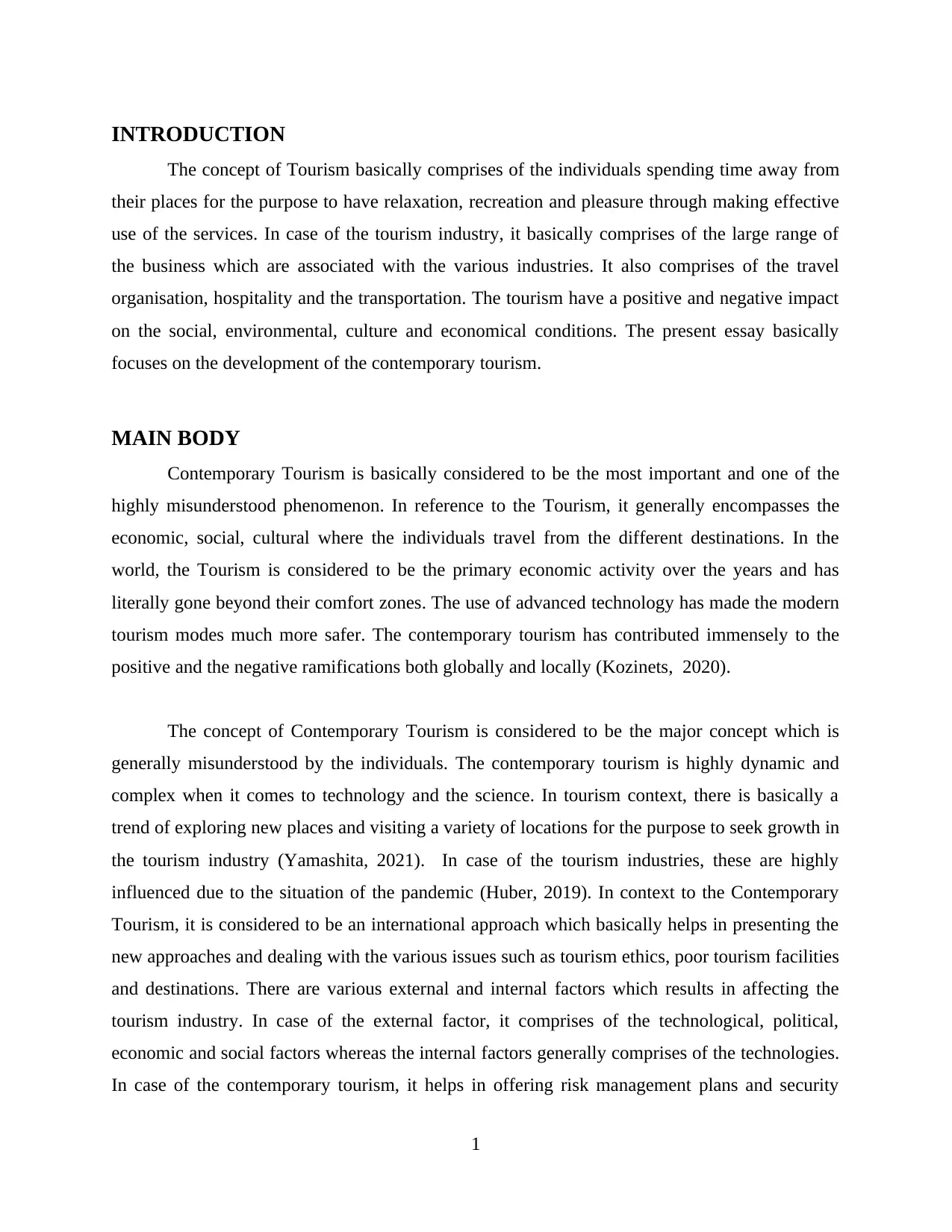
INTRODUCTION
The concept of Tourism basically comprises of the individuals spending time away from
their places for the purpose to have relaxation, recreation and pleasure through making effective
use of the services. In case of the tourism industry, it basically comprises of the large range of
the business which are associated with the various industries. It also comprises of the travel
organisation, hospitality and the transportation. The tourism have a positive and negative impact
on the social, environmental, culture and economical conditions. The present essay basically
focuses on the development of the contemporary tourism.
MAIN BODY
Contemporary Tourism is basically considered to be the most important and one of the
highly misunderstood phenomenon. In reference to the Tourism, it generally encompasses the
economic, social, cultural where the individuals travel from the different destinations. In the
world, the Tourism is considered to be the primary economic activity over the years and has
literally gone beyond their comfort zones. The use of advanced technology has made the modern
tourism modes much more safer. The contemporary tourism has contributed immensely to the
positive and the negative ramifications both globally and locally (Kozinets, 2020).
The concept of Contemporary Tourism is considered to be the major concept which is
generally misunderstood by the individuals. The contemporary tourism is highly dynamic and
complex when it comes to technology and the science. In tourism context, there is basically a
trend of exploring new places and visiting a variety of locations for the purpose to seek growth in
the tourism industry (Yamashita, 2021). In case of the tourism industries, these are highly
influenced due to the situation of the pandemic (Huber, 2019). In context to the Contemporary
Tourism, it is considered to be an international approach which basically helps in presenting the
new approaches and dealing with the various issues such as tourism ethics, poor tourism facilities
and destinations. There are various external and internal factors which results in affecting the
tourism industry. In case of the external factor, it comprises of the technological, political,
economic and social factors whereas the internal factors generally comprises of the technologies.
In case of the contemporary tourism, it helps in offering risk management plans and security
1
The concept of Tourism basically comprises of the individuals spending time away from
their places for the purpose to have relaxation, recreation and pleasure through making effective
use of the services. In case of the tourism industry, it basically comprises of the large range of
the business which are associated with the various industries. It also comprises of the travel
organisation, hospitality and the transportation. The tourism have a positive and negative impact
on the social, environmental, culture and economical conditions. The present essay basically
focuses on the development of the contemporary tourism.
MAIN BODY
Contemporary Tourism is basically considered to be the most important and one of the
highly misunderstood phenomenon. In reference to the Tourism, it generally encompasses the
economic, social, cultural where the individuals travel from the different destinations. In the
world, the Tourism is considered to be the primary economic activity over the years and has
literally gone beyond their comfort zones. The use of advanced technology has made the modern
tourism modes much more safer. The contemporary tourism has contributed immensely to the
positive and the negative ramifications both globally and locally (Kozinets, 2020).
The concept of Contemporary Tourism is considered to be the major concept which is
generally misunderstood by the individuals. The contemporary tourism is highly dynamic and
complex when it comes to technology and the science. In tourism context, there is basically a
trend of exploring new places and visiting a variety of locations for the purpose to seek growth in
the tourism industry (Yamashita, 2021). In case of the tourism industries, these are highly
influenced due to the situation of the pandemic (Huber, 2019). In context to the Contemporary
Tourism, it is considered to be an international approach which basically helps in presenting the
new approaches and dealing with the various issues such as tourism ethics, poor tourism facilities
and destinations. There are various external and internal factors which results in affecting the
tourism industry. In case of the external factor, it comprises of the technological, political,
economic and social factors whereas the internal factors generally comprises of the technologies.
In case of the contemporary tourism, it helps in offering risk management plans and security
1
⊘ This is a preview!⊘
Do you want full access?
Subscribe today to unlock all pages.

Trusted by 1+ million students worldwide
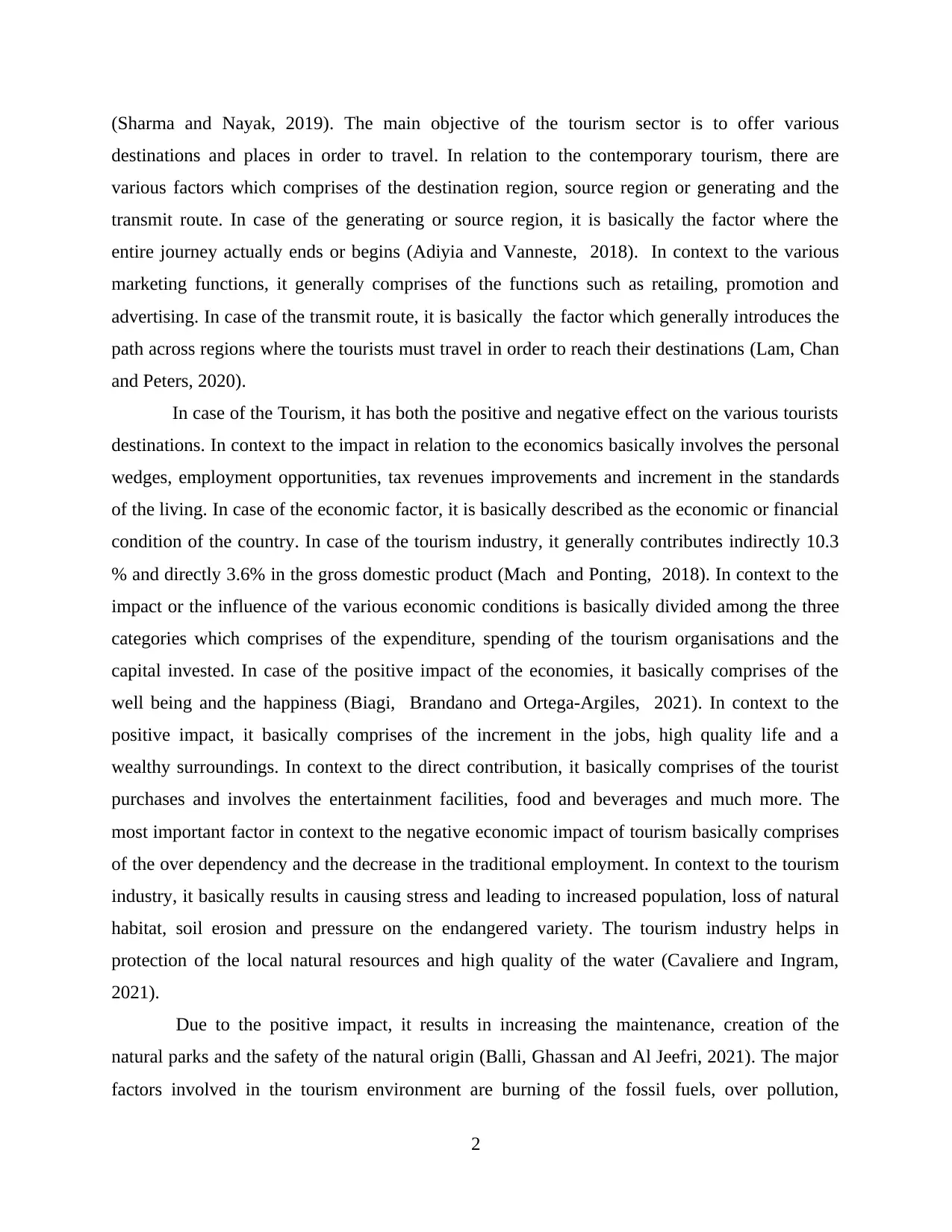
(Sharma and Nayak, 2019). The main objective of the tourism sector is to offer various
destinations and places in order to travel. In relation to the contemporary tourism, there are
various factors which comprises of the destination region, source region or generating and the
transmit route. In case of the generating or source region, it is basically the factor where the
entire journey actually ends or begins (Adiyia and Vanneste, 2018). In context to the various
marketing functions, it generally comprises of the functions such as retailing, promotion and
advertising. In case of the transmit route, it is basically the factor which generally introduces the
path across regions where the tourists must travel in order to reach their destinations (Lam, Chan
and Peters, 2020).
In case of the Tourism, it has both the positive and negative effect on the various tourists
destinations. In context to the impact in relation to the economics basically involves the personal
wedges, employment opportunities, tax revenues improvements and increment in the standards
of the living. In case of the economic factor, it is basically described as the economic or financial
condition of the country. In case of the tourism industry, it generally contributes indirectly 10.3
% and directly 3.6% in the gross domestic product (Mach and Ponting, 2018). In context to the
impact or the influence of the various economic conditions is basically divided among the three
categories which comprises of the expenditure, spending of the tourism organisations and the
capital invested. In case of the positive impact of the economies, it basically comprises of the
well being and the happiness (Biagi, Brandano and Ortega-Argiles, 2021). In context to the
positive impact, it basically comprises of the increment in the jobs, high quality life and a
wealthy surroundings. In context to the direct contribution, it basically comprises of the tourist
purchases and involves the entertainment facilities, food and beverages and much more. The
most important factor in context to the negative economic impact of tourism basically comprises
of the over dependency and the decrease in the traditional employment. In context to the tourism
industry, it basically results in causing stress and leading to increased population, loss of natural
habitat, soil erosion and pressure on the endangered variety. The tourism industry helps in
protection of the local natural resources and high quality of the water (Cavaliere and Ingram,
2021).
Due to the positive impact, it results in increasing the maintenance, creation of the
natural parks and the safety of the natural origin (Balli, Ghassan and Al Jeefri, 2021). The major
factors involved in the tourism environment are burning of the fossil fuels, over pollution,
2
destinations and places in order to travel. In relation to the contemporary tourism, there are
various factors which comprises of the destination region, source region or generating and the
transmit route. In case of the generating or source region, it is basically the factor where the
entire journey actually ends or begins (Adiyia and Vanneste, 2018). In context to the various
marketing functions, it generally comprises of the functions such as retailing, promotion and
advertising. In case of the transmit route, it is basically the factor which generally introduces the
path across regions where the tourists must travel in order to reach their destinations (Lam, Chan
and Peters, 2020).
In case of the Tourism, it has both the positive and negative effect on the various tourists
destinations. In context to the impact in relation to the economics basically involves the personal
wedges, employment opportunities, tax revenues improvements and increment in the standards
of the living. In case of the economic factor, it is basically described as the economic or financial
condition of the country. In case of the tourism industry, it generally contributes indirectly 10.3
% and directly 3.6% in the gross domestic product (Mach and Ponting, 2018). In context to the
impact or the influence of the various economic conditions is basically divided among the three
categories which comprises of the expenditure, spending of the tourism organisations and the
capital invested. In case of the positive impact of the economies, it basically comprises of the
well being and the happiness (Biagi, Brandano and Ortega-Argiles, 2021). In context to the
positive impact, it basically comprises of the increment in the jobs, high quality life and a
wealthy surroundings. In context to the direct contribution, it basically comprises of the tourist
purchases and involves the entertainment facilities, food and beverages and much more. The
most important factor in context to the negative economic impact of tourism basically comprises
of the over dependency and the decrease in the traditional employment. In context to the tourism
industry, it basically results in causing stress and leading to increased population, loss of natural
habitat, soil erosion and pressure on the endangered variety. The tourism industry helps in
protection of the local natural resources and high quality of the water (Cavaliere and Ingram,
2021).
Due to the positive impact, it results in increasing the maintenance, creation of the
natural parks and the safety of the natural origin (Balli, Ghassan and Al Jeefri, 2021). The major
factors involved in the tourism environment are burning of the fossil fuels, over pollution,
2
Paraphrase This Document
Need a fresh take? Get an instant paraphrase of this document with our AI Paraphraser
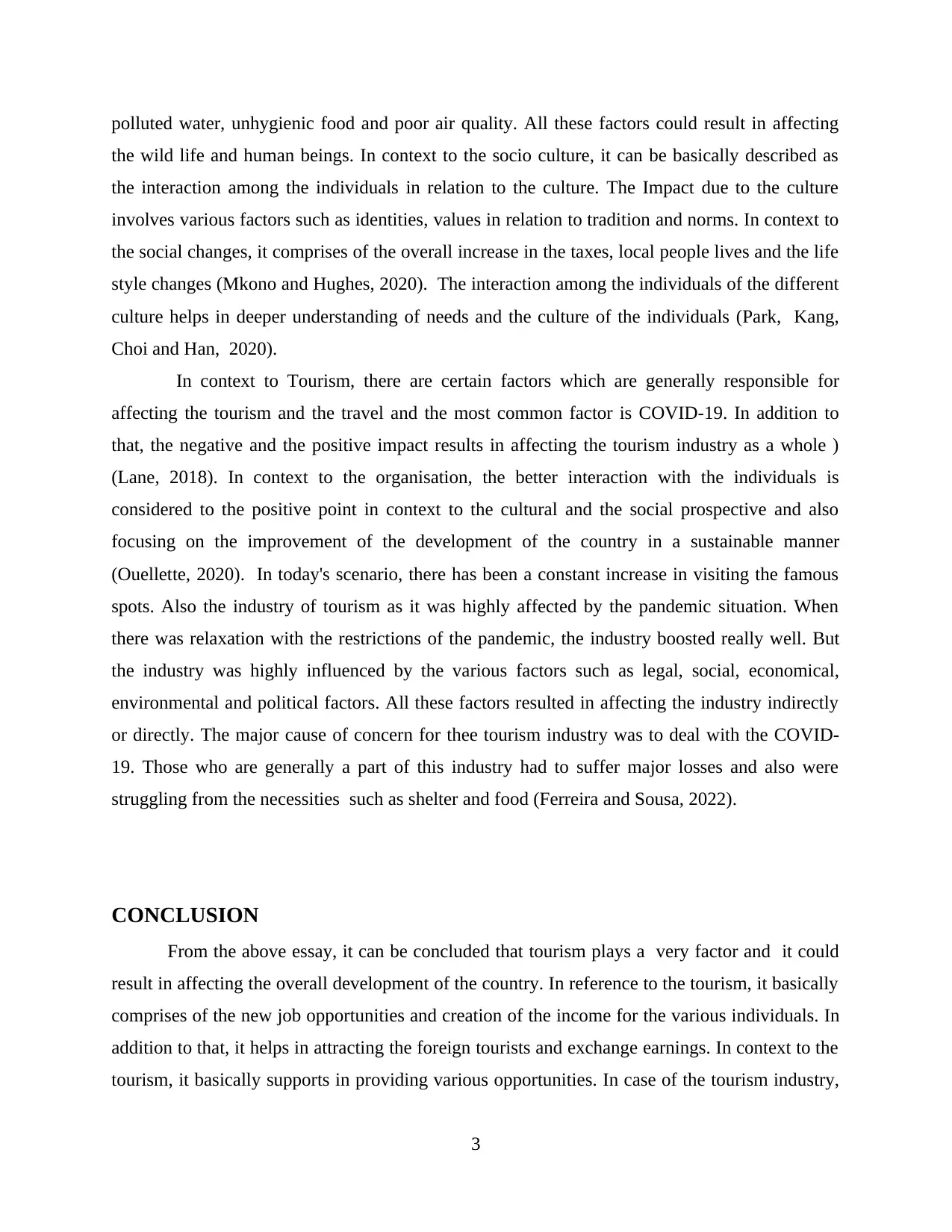
polluted water, unhygienic food and poor air quality. All these factors could result in affecting
the wild life and human beings. In context to the socio culture, it can be basically described as
the interaction among the individuals in relation to the culture. The Impact due to the culture
involves various factors such as identities, values in relation to tradition and norms. In context to
the social changes, it comprises of the overall increase in the taxes, local people lives and the life
style changes (Mkono and Hughes, 2020). The interaction among the individuals of the different
culture helps in deeper understanding of needs and the culture of the individuals (Park, Kang,
Choi and Han, 2020).
In context to Tourism, there are certain factors which are generally responsible for
affecting the tourism and the travel and the most common factor is COVID-19. In addition to
that, the negative and the positive impact results in affecting the tourism industry as a whole )
(Lane, 2018). In context to the organisation, the better interaction with the individuals is
considered to the positive point in context to the cultural and the social prospective and also
focusing on the improvement of the development of the country in a sustainable manner
(Ouellette, 2020). In today's scenario, there has been a constant increase in visiting the famous
spots. Also the industry of tourism as it was highly affected by the pandemic situation. When
there was relaxation with the restrictions of the pandemic, the industry boosted really well. But
the industry was highly influenced by the various factors such as legal, social, economical,
environmental and political factors. All these factors resulted in affecting the industry indirectly
or directly. The major cause of concern for thee tourism industry was to deal with the COVID-
19. Those who are generally a part of this industry had to suffer major losses and also were
struggling from the necessities such as shelter and food (Ferreira and Sousa, 2022).
CONCLUSION
From the above essay, it can be concluded that tourism plays a very factor and it could
result in affecting the overall development of the country. In reference to the tourism, it basically
comprises of the new job opportunities and creation of the income for the various individuals. In
addition to that, it helps in attracting the foreign tourists and exchange earnings. In context to the
tourism, it basically supports in providing various opportunities. In case of the tourism industry,
3
the wild life and human beings. In context to the socio culture, it can be basically described as
the interaction among the individuals in relation to the culture. The Impact due to the culture
involves various factors such as identities, values in relation to tradition and norms. In context to
the social changes, it comprises of the overall increase in the taxes, local people lives and the life
style changes (Mkono and Hughes, 2020). The interaction among the individuals of the different
culture helps in deeper understanding of needs and the culture of the individuals (Park, Kang,
Choi and Han, 2020).
In context to Tourism, there are certain factors which are generally responsible for
affecting the tourism and the travel and the most common factor is COVID-19. In addition to
that, the negative and the positive impact results in affecting the tourism industry as a whole )
(Lane, 2018). In context to the organisation, the better interaction with the individuals is
considered to the positive point in context to the cultural and the social prospective and also
focusing on the improvement of the development of the country in a sustainable manner
(Ouellette, 2020). In today's scenario, there has been a constant increase in visiting the famous
spots. Also the industry of tourism as it was highly affected by the pandemic situation. When
there was relaxation with the restrictions of the pandemic, the industry boosted really well. But
the industry was highly influenced by the various factors such as legal, social, economical,
environmental and political factors. All these factors resulted in affecting the industry indirectly
or directly. The major cause of concern for thee tourism industry was to deal with the COVID-
19. Those who are generally a part of this industry had to suffer major losses and also were
struggling from the necessities such as shelter and food (Ferreira and Sousa, 2022).
CONCLUSION
From the above essay, it can be concluded that tourism plays a very factor and it could
result in affecting the overall development of the country. In reference to the tourism, it basically
comprises of the new job opportunities and creation of the income for the various individuals. In
addition to that, it helps in attracting the foreign tourists and exchange earnings. In context to the
tourism, it basically supports in providing various opportunities. In case of the tourism industry,
3
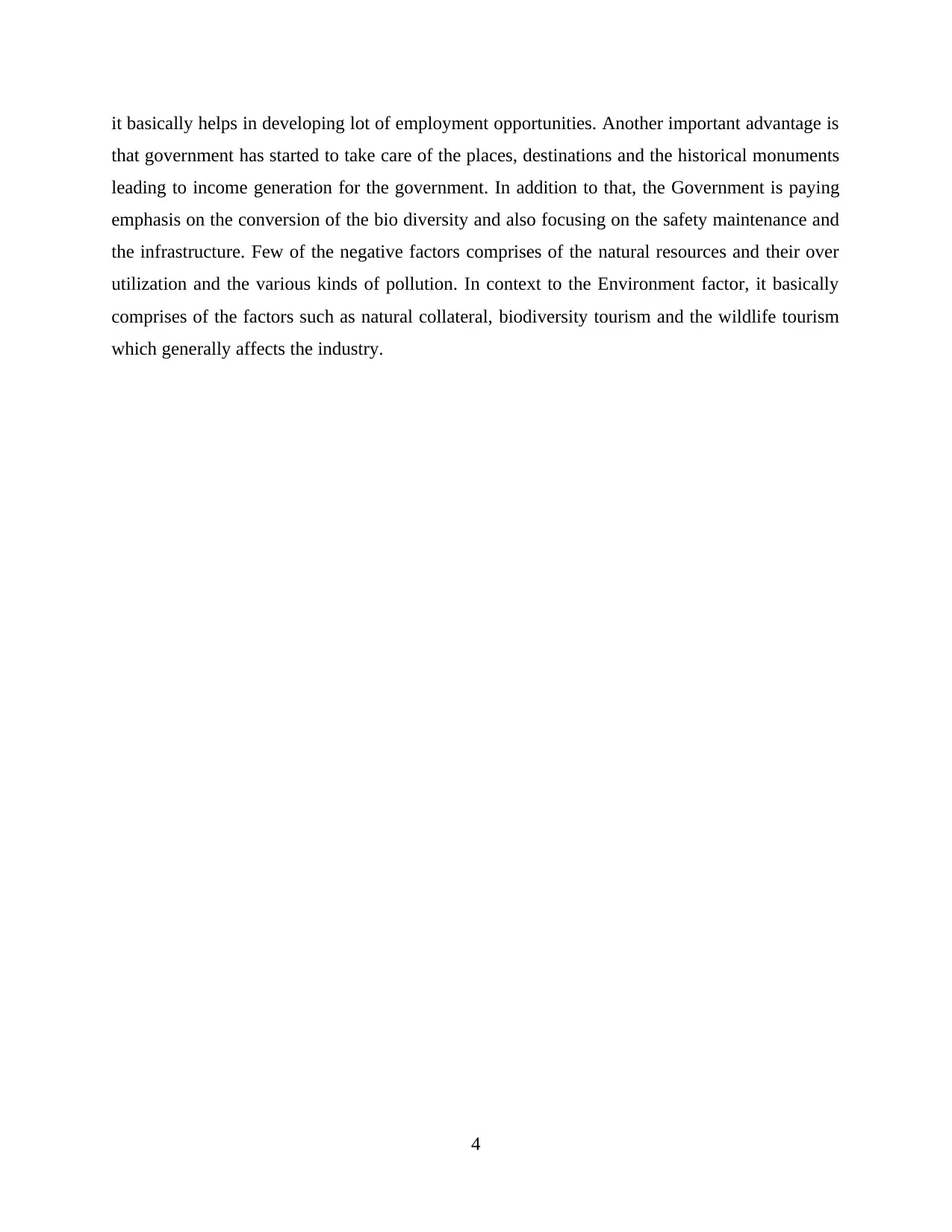
it basically helps in developing lot of employment opportunities. Another important advantage is
that government has started to take care of the places, destinations and the historical monuments
leading to income generation for the government. In addition to that, the Government is paying
emphasis on the conversion of the bio diversity and also focusing on the safety maintenance and
the infrastructure. Few of the negative factors comprises of the natural resources and their over
utilization and the various kinds of pollution. In context to the Environment factor, it basically
comprises of the factors such as natural collateral, biodiversity tourism and the wildlife tourism
which generally affects the industry.
4
that government has started to take care of the places, destinations and the historical monuments
leading to income generation for the government. In addition to that, the Government is paying
emphasis on the conversion of the bio diversity and also focusing on the safety maintenance and
the infrastructure. Few of the negative factors comprises of the natural resources and their over
utilization and the various kinds of pollution. In context to the Environment factor, it basically
comprises of the factors such as natural collateral, biodiversity tourism and the wildlife tourism
which generally affects the industry.
4
⊘ This is a preview!⊘
Do you want full access?
Subscribe today to unlock all pages.

Trusted by 1+ million students worldwide
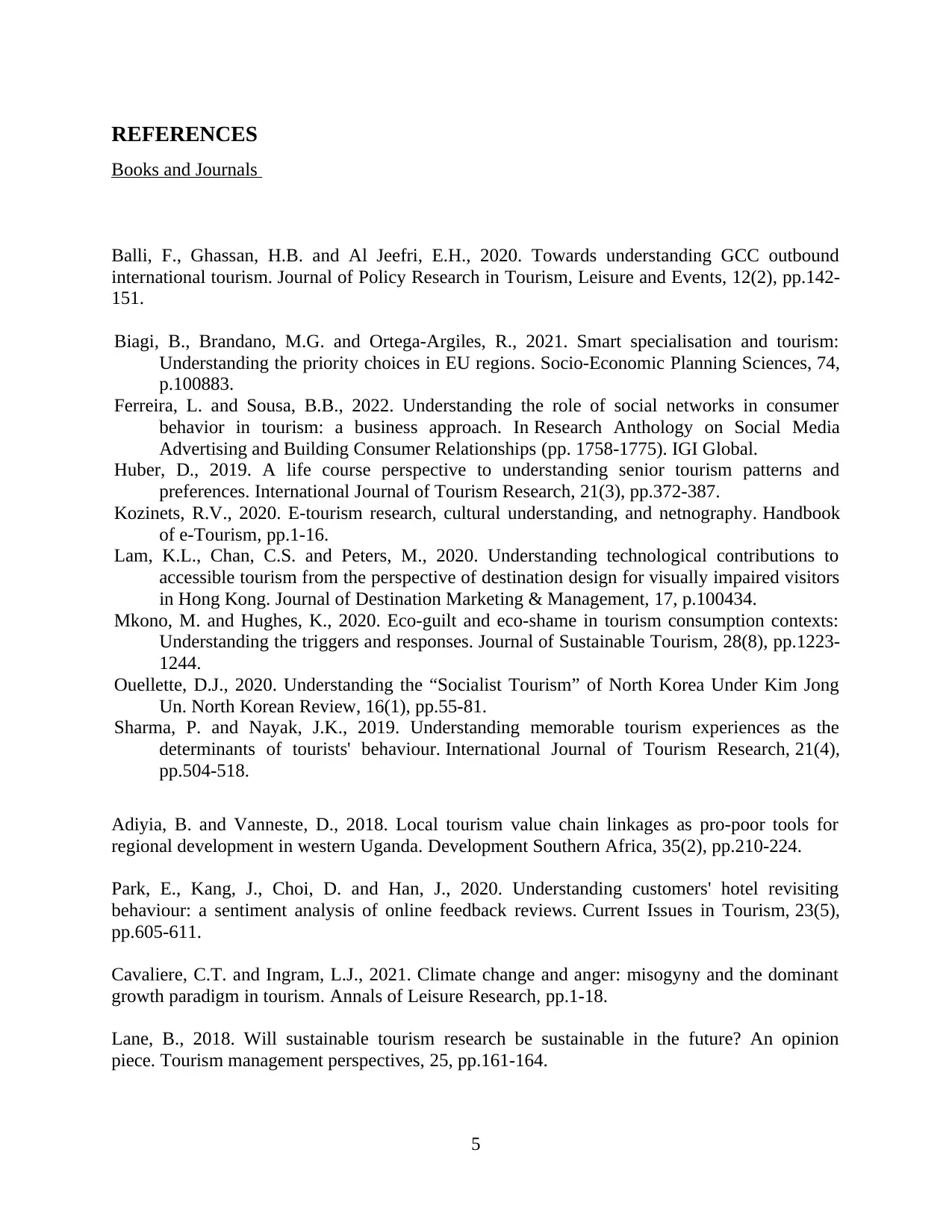
REFERENCES
Books and Journals
Balli, F., Ghassan, H.B. and Al Jeefri, E.H., 2020. Towards understanding GCC outbound
international tourism. Journal of Policy Research in Tourism, Leisure and Events, 12(2), pp.142-
151.
Biagi, B., Brandano, M.G. and Ortega-Argiles, R., 2021. Smart specialisation and tourism:
Understanding the priority choices in EU regions. Socio-Economic Planning Sciences, 74,
p.100883.
Ferreira, L. and Sousa, B.B., 2022. Understanding the role of social networks in consumer
behavior in tourism: a business approach. In Research Anthology on Social Media
Advertising and Building Consumer Relationships (pp. 1758-1775). IGI Global.
Huber, D., 2019. A life course perspective to understanding senior tourism patterns and
preferences. International Journal of Tourism Research, 21(3), pp.372-387.
Kozinets, R.V., 2020. E-tourism research, cultural understanding, and netnography. Handbook
of e-Tourism, pp.1-16.
Lam, K.L., Chan, C.S. and Peters, M., 2020. Understanding technological contributions to
accessible tourism from the perspective of destination design for visually impaired visitors
in Hong Kong. Journal of Destination Marketing & Management, 17, p.100434.
Mkono, M. and Hughes, K., 2020. Eco-guilt and eco-shame in tourism consumption contexts:
Understanding the triggers and responses. Journal of Sustainable Tourism, 28(8), pp.1223-
1244.
Ouellette, D.J., 2020. Understanding the “Socialist Tourism” of North Korea Under Kim Jong
Un. North Korean Review, 16(1), pp.55-81.
Sharma, P. and Nayak, J.K., 2019. Understanding memorable tourism experiences as the
determinants of tourists' behaviour. International Journal of Tourism Research, 21(4),
pp.504-518.
Adiyia, B. and Vanneste, D., 2018. Local tourism value chain linkages as pro-poor tools for
regional development in western Uganda. Development Southern Africa, 35(2), pp.210-224.
Park, E., Kang, J., Choi, D. and Han, J., 2020. Understanding customers' hotel revisiting
behaviour: a sentiment analysis of online feedback reviews. Current Issues in Tourism, 23(5),
pp.605-611.
Cavaliere, C.T. and Ingram, L.J., 2021. Climate change and anger: misogyny and the dominant
growth paradigm in tourism. Annals of Leisure Research, pp.1-18.
Lane, B., 2018. Will sustainable tourism research be sustainable in the future? An opinion
piece. Tourism management perspectives, 25, pp.161-164.
5
Books and Journals
Balli, F., Ghassan, H.B. and Al Jeefri, E.H., 2020. Towards understanding GCC outbound
international tourism. Journal of Policy Research in Tourism, Leisure and Events, 12(2), pp.142-
151.
Biagi, B., Brandano, M.G. and Ortega-Argiles, R., 2021. Smart specialisation and tourism:
Understanding the priority choices in EU regions. Socio-Economic Planning Sciences, 74,
p.100883.
Ferreira, L. and Sousa, B.B., 2022. Understanding the role of social networks in consumer
behavior in tourism: a business approach. In Research Anthology on Social Media
Advertising and Building Consumer Relationships (pp. 1758-1775). IGI Global.
Huber, D., 2019. A life course perspective to understanding senior tourism patterns and
preferences. International Journal of Tourism Research, 21(3), pp.372-387.
Kozinets, R.V., 2020. E-tourism research, cultural understanding, and netnography. Handbook
of e-Tourism, pp.1-16.
Lam, K.L., Chan, C.S. and Peters, M., 2020. Understanding technological contributions to
accessible tourism from the perspective of destination design for visually impaired visitors
in Hong Kong. Journal of Destination Marketing & Management, 17, p.100434.
Mkono, M. and Hughes, K., 2020. Eco-guilt and eco-shame in tourism consumption contexts:
Understanding the triggers and responses. Journal of Sustainable Tourism, 28(8), pp.1223-
1244.
Ouellette, D.J., 2020. Understanding the “Socialist Tourism” of North Korea Under Kim Jong
Un. North Korean Review, 16(1), pp.55-81.
Sharma, P. and Nayak, J.K., 2019. Understanding memorable tourism experiences as the
determinants of tourists' behaviour. International Journal of Tourism Research, 21(4),
pp.504-518.
Adiyia, B. and Vanneste, D., 2018. Local tourism value chain linkages as pro-poor tools for
regional development in western Uganda. Development Southern Africa, 35(2), pp.210-224.
Park, E., Kang, J., Choi, D. and Han, J., 2020. Understanding customers' hotel revisiting
behaviour: a sentiment analysis of online feedback reviews. Current Issues in Tourism, 23(5),
pp.605-611.
Cavaliere, C.T. and Ingram, L.J., 2021. Climate change and anger: misogyny and the dominant
growth paradigm in tourism. Annals of Leisure Research, pp.1-18.
Lane, B., 2018. Will sustainable tourism research be sustainable in the future? An opinion
piece. Tourism management perspectives, 25, pp.161-164.
5
Paraphrase This Document
Need a fresh take? Get an instant paraphrase of this document with our AI Paraphraser
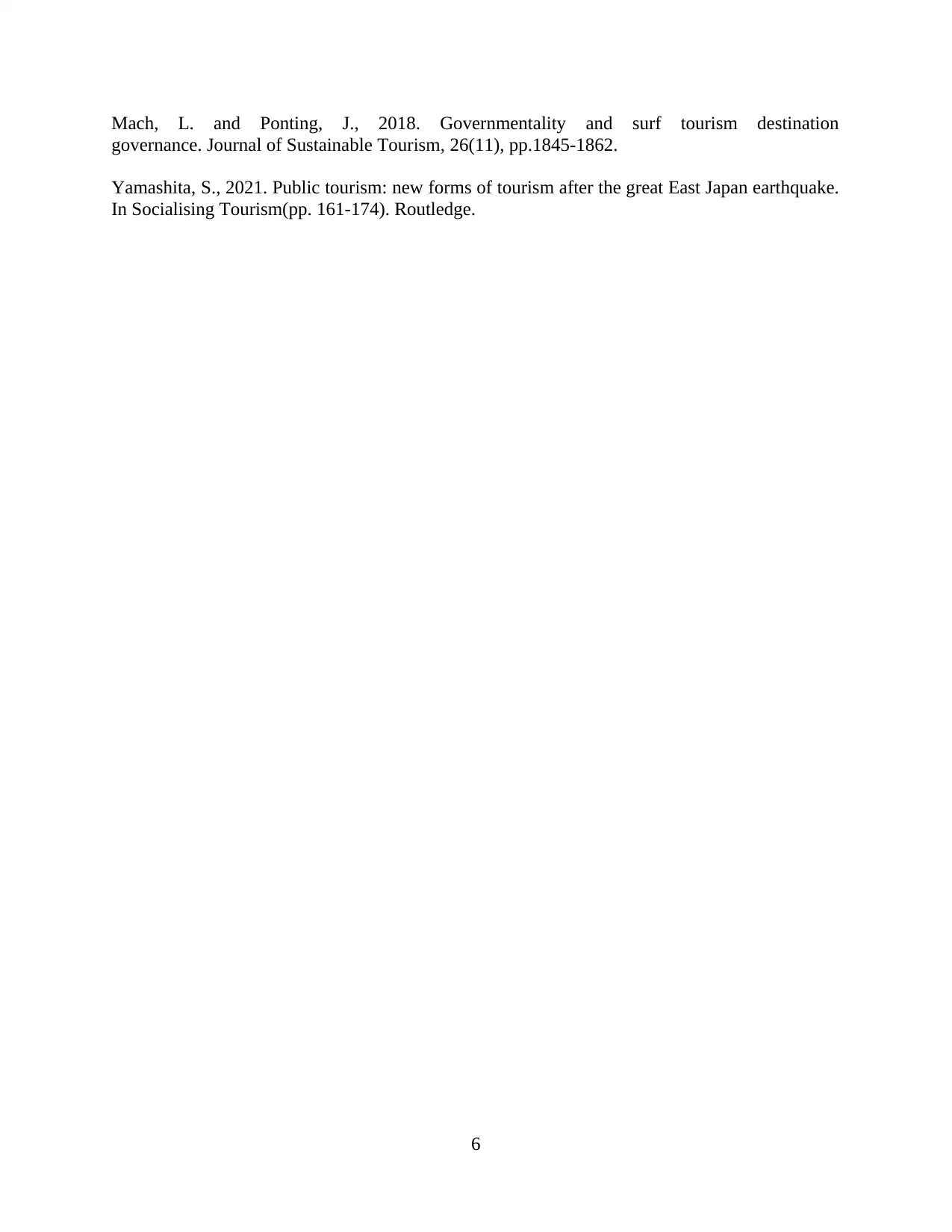
Mach, L. and Ponting, J., 2018. Governmentality and surf tourism destination
governance. Journal of Sustainable Tourism, 26(11), pp.1845-1862.
Yamashita, S., 2021. Public tourism: new forms of tourism after the great East Japan earthquake.
In Socialising Tourism(pp. 161-174). Routledge.
6
governance. Journal of Sustainable Tourism, 26(11), pp.1845-1862.
Yamashita, S., 2021. Public tourism: new forms of tourism after the great East Japan earthquake.
In Socialising Tourism(pp. 161-174). Routledge.
6

7
⊘ This is a preview!⊘
Do you want full access?
Subscribe today to unlock all pages.

Trusted by 1+ million students worldwide
1 out of 9
Related Documents
Your All-in-One AI-Powered Toolkit for Academic Success.
+13062052269
info@desklib.com
Available 24*7 on WhatsApp / Email
![[object Object]](/_next/static/media/star-bottom.7253800d.svg)
Unlock your academic potential
Copyright © 2020–2026 A2Z Services. All Rights Reserved. Developed and managed by ZUCOL.
